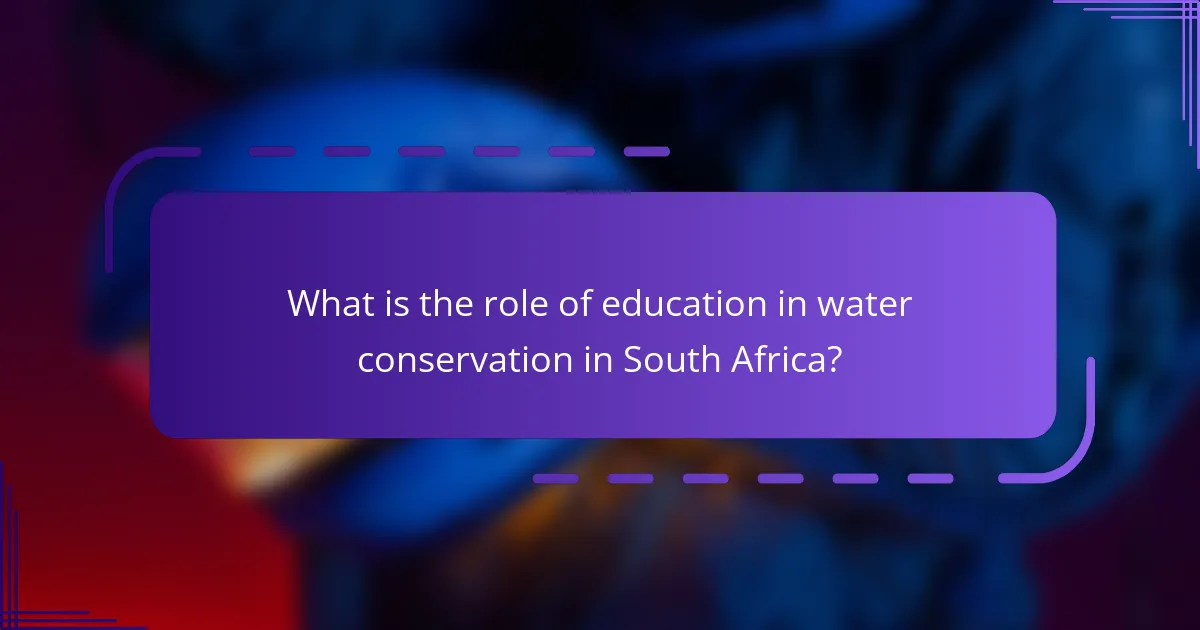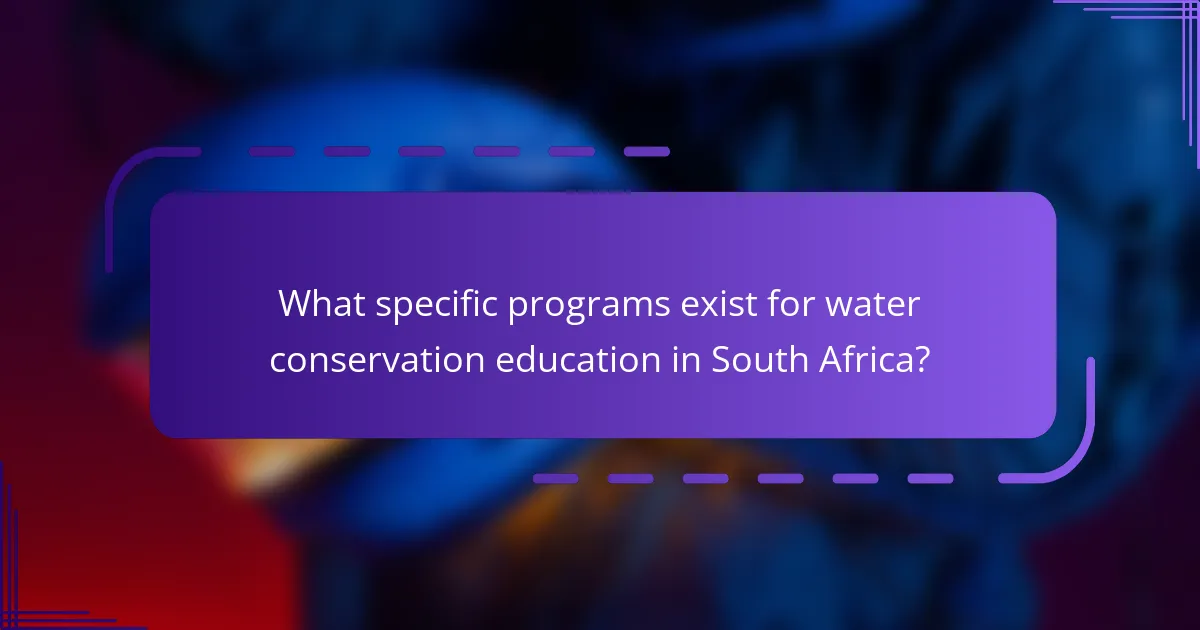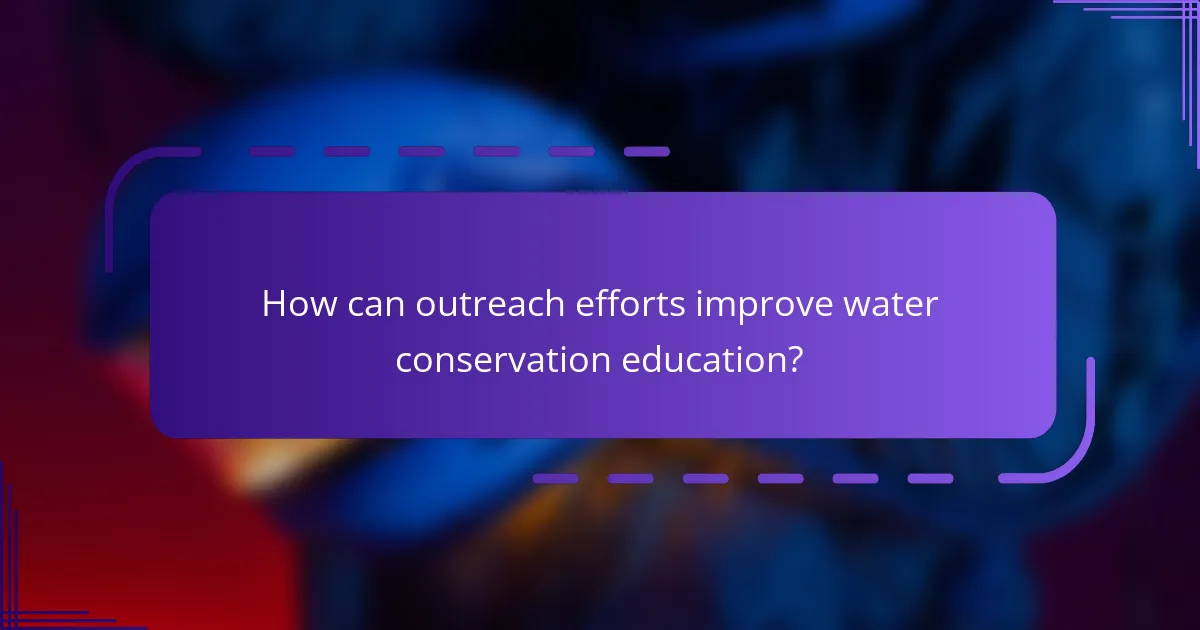Education is a vital component in promoting water conservation in South Africa, influencing community awareness and sustainable practices. Various educational programs, such as the “Water Wise” initiative and “Catchment Management” efforts, aim to enhance understanding of water scarcity and responsible usage among individuals and communities. The Department of Water and Sanitation supports outreach programs that engage citizens through workshops and campaigns, leading to measurable improvements in water-saving behaviors. Research indicates that informed communities are more likely to adopt conservation habits, demonstrating the effectiveness of targeted educational strategies in reducing water consumption.

What is the role of education in water conservation in South Africa?
Education plays a critical role in water conservation in South Africa. It raises awareness about the importance of water resources. Educational programs teach communities about sustainable practices. Schools incorporate water conservation into their curricula. This fosters a culture of responsibility towards water usage. Community workshops further engage citizens in conservation efforts. Research shows that informed individuals are more likely to adopt water-saving habits. For instance, the Water Research Commission highlights the impact of educational initiatives on water-saving behaviors.
How does education contribute to water conservation efforts?
Education contributes to water conservation efforts by raising awareness and promoting sustainable practices. It informs individuals about the importance of water resources. Educational programs teach practical skills, such as rainwater harvesting and efficient irrigation techniques. Schools often incorporate water conservation into their curricula. This knowledge empowers communities to take action. Research shows that informed communities are more likely to engage in conservation efforts. For example, a study by the Water Research Commission indicates that education initiatives significantly reduce water wastage in households. Thus, education plays a critical role in fostering a culture of water conservation.
What are the key educational programs focused on water conservation?
Key educational programs focused on water conservation include the Water Wise program and the Eco-Schools initiative. The Water Wise program aims to educate communities about sustainable water use. It provides resources and workshops for schools and local organizations. The Eco-Schools initiative encourages environmental education in schools. It promotes projects that involve students in water conservation activities. Both programs emphasize practical engagement and community participation. They have been shown to raise awareness about water scarcity issues in South Africa. These initiatives are crucial for fostering a culture of conservation among future generations.
How do these programs raise awareness about water scarcity?
These programs raise awareness about water scarcity through education and community engagement initiatives. They provide workshops that inform participants about the causes and effects of water scarcity. Educational materials are distributed to schools and communities to enhance understanding. Interactive activities, such as water conservation challenges, engage participants directly. Social media campaigns amplify the message, reaching a broader audience. Collaborations with local organizations help disseminate information effectively. Surveys indicate increased knowledge about water issues among participants after program involvement. This approach fosters a culture of water conservation in communities.
Why is community engagement vital for water conservation education?
Community engagement is vital for water conservation education because it fosters local involvement and ownership of water resources. Engaged communities are more likely to adopt sustainable practices. They can share knowledge and experiences that resonate with local values. This creates a culture of conservation that is more effective than top-down approaches. Studies show that participatory programs lead to a 20% increase in water-saving behaviors. Engagement also enhances awareness of water issues, making residents more proactive. Local partnerships can amplify educational efforts and resources. Thus, community involvement is essential for effective water conservation education.
What strategies are used to engage communities in water conservation?
Community engagement in water conservation involves several effective strategies. Educational programs inform residents about water scarcity issues. Workshops teach practical water-saving techniques. Community events foster collaboration and awareness. Incentive programs encourage participation through rewards for water-saving behaviors. Social media campaigns raise awareness and share success stories. Partnerships with local organizations amplify outreach efforts. Surveys and feedback mechanisms involve the community in decision-making. These strategies have been shown to increase community participation and awareness in water conservation initiatives.
How do community workshops enhance understanding of water issues?
Community workshops enhance understanding of water issues by providing interactive learning experiences. Participants engage directly with experts and peers. This interaction fosters dialogue and encourages questions. Workshops often include hands-on activities that illustrate water conservation techniques. Visual aids and demonstrations make complex concepts more accessible. Research shows that experiential learning improves retention of information. For example, a study by the Water Research Commission found that community workshops increased knowledge retention by 40%. This approach empowers individuals to make informed decisions about water usage. Overall, community workshops serve as vital platforms for education and awareness in water conservation.

What specific programs exist for water conservation education in South Africa?
The specific programs for water conservation education in South Africa include the “Water Wise” program and the “Catchment Management” initiatives. The Water Wise program focuses on promoting water conservation practices in schools and communities. It provides educational resources and tools to encourage responsible water use. The program aims to raise awareness about water scarcity and the importance of conservation.
Catchment Management initiatives involve local communities in managing water resources sustainably. These programs educate participants on the significance of protecting water sources and ecosystems. They often include workshops and training sessions to enhance knowledge and skills in water management.
Furthermore, the Department of Water and Sanitation supports various outreach programs. These programs aim to educate the public about water conservation methods and practices. They often collaborate with NGOs and local governments to maximize outreach efforts.
How do government initiatives support water conservation education?
Government initiatives support water conservation education through funding, awareness campaigns, and educational programs. These initiatives often provide financial resources to schools and community organizations. They create public awareness campaigns that inform citizens about the importance of water conservation. Educational programs are developed to teach sustainable practices. For example, the South African government has implemented the National Water Resource Strategy. This strategy includes educational outreach as a key component. Research shows that communities engaged in these programs reduce water usage significantly. In 2020, a study found that schools participating in government-funded programs decreased water consumption by up to 30%.
What are the main goals of these government programs?
The main goals of these government programs are to promote water conservation and raise awareness about sustainable practices. These programs aim to educate communities on the importance of water management. They also seek to engage citizens in practical conservation efforts. By fostering community involvement, the programs enhance local stewardship of water resources. Additionally, they aim to reduce water wastage through targeted outreach initiatives. Evidence shows that educational campaigns can significantly influence public behavior regarding water use. For instance, studies indicate that informed communities are more likely to adopt water-saving technologies. Overall, these goals contribute to the sustainable management of South Africa’s water resources.
How effective are these initiatives in changing public behavior?
These initiatives are effective in changing public behavior regarding water conservation. Studies show that educational programs lead to increased awareness and behavioral changes. For instance, a report by the South African Department of Water and Sanitation found that communities involved in outreach programs reduced water usage by 20%. Furthermore, participants in workshops demonstrated a 35% improvement in water-saving practices. This data indicates that structured education and community engagement significantly influence public behavior towards water conservation.
What role do NGOs play in promoting water conservation education?
NGOs play a crucial role in promoting water conservation education. They develop and implement educational programs targeting communities. These programs often focus on sustainable water usage and conservation practices. NGOs also conduct workshops and training sessions to raise awareness. They collaborate with local governments and communities to enhance outreach. Research indicates that community engagement is vital for effective water conservation education. For example, the South African NGO, WaterAid, has successfully implemented initiatives that educate communities on water management. Their efforts have led to increased awareness and behavioral changes regarding water usage.
Which NGOs are leading in water conservation education efforts?
The leading NGOs in water conservation education efforts include the World Wildlife Fund (WWF), WaterAid, and the African Water Association. WWF promotes sustainable water management through education and community engagement. WaterAid focuses on providing clean water and sanitation education in vulnerable communities. The African Water Association supports knowledge sharing and capacity building in water management across Africa. These organizations implement various programs aimed at raising awareness and educating communities about water conservation practices.
What unique approaches do these NGOs take to educate communities?
NGOs in South Africa employ innovative methods to educate communities about water conservation. They utilize interactive workshops that engage community members in hands-on learning experiences. These workshops often incorporate local cultural practices to make the information more relatable. NGOs also leverage mobile technology to disseminate information quickly and effectively. They create educational apps that provide tips and resources for water-saving practices. Additionally, these organizations partner with local schools to integrate water conservation into the curriculum. This approach fosters a sense of responsibility among younger generations. Furthermore, NGOs conduct community forums that encourage dialogue and knowledge sharing. These forums help address specific local water issues and promote collective action.

How can outreach efforts improve water conservation education?
Outreach efforts can significantly enhance water conservation education by increasing community awareness and engagement. These efforts can include workshops, community events, and informational campaigns. By providing hands-on experiences, outreach fosters a deeper understanding of water issues. Studies show that communities involved in outreach programs demonstrate higher water-saving behaviors. For instance, a 2020 study by the Water Research Commission indicated that outreach initiatives in South Africa led to a 15% reduction in household water usage. This proves that targeted outreach can effectively change behaviors and attitudes towards water conservation.
What are the most effective outreach strategies for water conservation?
The most effective outreach strategies for water conservation include community workshops, educational campaigns, and social media engagement. Community workshops provide hands-on learning experiences about water-saving techniques. Educational campaigns raise awareness through schools and local organizations. Social media engagement spreads information quickly and fosters community discussions. Research shows that communities participating in workshops reduced water usage by an average of 20%. Additionally, campaigns that involve local leaders have been proven to increase participation rates significantly. Engaging the community through multiple channels ensures a broader reach and greater impact on water conservation efforts.
How do social media campaigns raise awareness about water issues?
Social media campaigns raise awareness about water issues by disseminating information rapidly to a broad audience. They utilize engaging content such as infographics, videos, and testimonials. These formats simplify complex data about water scarcity and pollution. Campaigns often include calls to action, encouraging individuals to participate in conservation efforts. Hashtags and challenges on platforms like Twitter and Instagram enhance visibility and engagement. Research shows that visual content is shared 40 times more than text-based content. Social media analytics can track engagement metrics, demonstrating the campaigns’ reach and impact. Overall, these campaigns foster community dialogue and increase public knowledge about critical water issues.
What role do schools play in outreach efforts for water conservation?
Schools play a crucial role in outreach efforts for water conservation. They educate students on the importance of water sustainability. This education often includes lessons on the water cycle and conservation techniques. Schools engage students through hands-on activities like water audits and conservation projects. Many schools partner with local organizations for community outreach. These partnerships help extend water conservation messages beyond the classroom. Research shows that educational programs can significantly increase awareness and behavioral change regarding water use. For example, the Water Research Commission of South Africa highlights the effectiveness of school-based programs in promoting water-saving habits among youth.
What challenges do educational programs face in promoting water conservation?
Educational programs face several challenges in promoting water conservation. One significant challenge is a lack of awareness among the target audience. Many individuals do not understand the importance of water conservation. This gap in knowledge can hinder participation in educational initiatives.
Additionally, cultural attitudes towards water usage can pose obstacles. In some communities, traditional practices may prioritize water use over conservation efforts. Resistance to change can limit the effectiveness of educational programs.
Resource constraints also play a critical role. Many programs operate with limited funding, restricting their reach and impact. This financial limitation can affect the quality of educational materials and outreach efforts.
Furthermore, the complexity of water issues can overwhelm participants. Educational content may be too technical, making it difficult for the general public to engage. Simplifying information is essential for effective communication.
Lastly, measuring the impact of educational programs can be challenging. Without clear metrics, it is difficult to assess success and make necessary adjustments. This lack of evaluation can lead to stagnation in program development.
How do socio-economic factors affect the success of these programs?
Socio-economic factors significantly influence the success of water conservation education programs in South Africa. Higher income levels often correlate with greater access to resources and information, facilitating participation in such programs. Conversely, low-income communities may lack the financial means to implement water-saving practices. Education levels also play a crucial role; more educated individuals are likely to understand the importance of water conservation. Additionally, socio-economic status affects community engagement; communities with stronger networks can mobilize more effectively for outreach initiatives. Data shows that programs tailored to address specific socio-economic challenges achieve better outcomes. For instance, a study by the Water Research Commission highlights the effectiveness of targeted education in low-income areas. This demonstrates that socio-economic factors are pivotal in determining program reach and effectiveness.
What solutions can be implemented to overcome these challenges?
Implementing solutions to overcome challenges in water conservation education in South Africa involves enhancing community engagement programs. These programs should focus on practical workshops that teach water-saving techniques. Schools can integrate water conservation into their curricula, promoting awareness from a young age. Collaboration with local governments can amplify outreach efforts. Utilizing social media campaigns can effectively reach a broader audience. Establishing partnerships with NGOs can provide resources and expertise. Regular community events can foster a culture of conservation. Research indicates that hands-on learning significantly improves retention of conservation practices.
What are some best practices for effective water conservation education?
Effective water conservation education should involve hands-on learning experiences. Engaging activities allow participants to understand water usage directly. Workshops can demonstrate practical water-saving techniques. Community involvement fosters a sense of responsibility. Utilizing local case studies makes the information relatable. Visual aids and interactive tools enhance understanding. Regular assessments can measure knowledge retention and effectiveness. Collaboration with local organizations can expand outreach and resources.
How can educators create engaging content for water conservation topics?
Educators can create engaging content for water conservation topics by integrating interactive elements and real-world applications. They should use multimedia resources such as videos and infographics to present information visually. Incorporating hands-on activities helps students experience water conservation firsthand. Case studies of successful local initiatives can illustrate the impact of conservation efforts. Group discussions and debates on water issues foster critical thinking. Utilizing social media platforms can enhance outreach and engagement with broader audiences. According to the South African National Water Act, education plays a crucial role in promoting sustainable water use. Engaging content increases awareness and encourages responsible behaviors towards water conservation.
What resources are available for enhancing water conservation education?
Educational resources for enhancing water conservation education include various programs, materials, and community initiatives. Schools and universities often implement curricula focused on water conservation. Non-governmental organizations provide workshops and training sessions to raise awareness. Online platforms offer educational videos and interactive tools for learning. Government agencies publish guides and resources for educators. Community outreach programs engage local populations in practical water-saving techniques. Research studies highlight the effectiveness of these educational initiatives, demonstrating improved water conservation practices among participants.
The main entity of the article is education in relation to water conservation in South Africa. The article outlines the critical role education plays in raising awareness and promoting sustainable water practices through various programs, such as the Water Wise program and Eco-Schools initiative. It highlights the importance of community engagement and outreach strategies, including workshops and social media campaigns, to enhance understanding of water issues. Additionally, it discusses the challenges educational programs face, such as socio-economic factors and resource constraints, while proposing solutions and best practices for effective water conservation education.